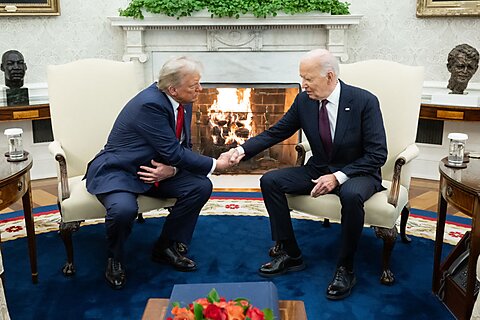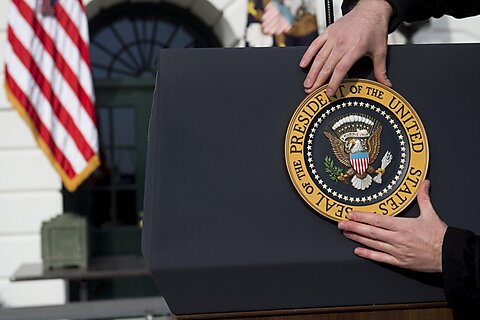Neal McCluskey
Watching the events in Israel and Gaza—the horrors of war inflicted on both sides—it is impossible to not be moved. Watching the anger and, sometimes, violence on college campuses across the country also, understandably, spurs powerful emotions, including in the halls of Congress. But understandable feelings do not mean that the federal government should inject itself into debates largely occurring in civil—free—society. It is not the proper federal role, and it threatens to reduce rather than promote harmony.
On Wednesday, the House of Representatives took its most concrete action to date, largely spurred by the scenes on college campuses across the country. It passed the Antisemitism Awareness Act, which would require the US Department of Education to “take into consideration” the International Holocaust Remembrance Alliance’s (IHRA) “working definition of antisemitism” when investigating schools for civil rights violations. Essentially, the department would judge if an incident was driven by antisemitism, and presumably if a college were allowing antisemitism to exist on campus.
The problem is that the definition includes all kinds of speech, most of which is not inherently threatening. Government punishment for such speech would be a fundamental violation of First Amendment rights.
IHRA “examples of antisemitism” include:
Accusing Jewish citizens of being more loyal to Israel, or to the alleged priorities of Jews worldwide, than to the interests of their own nations.
Denying the Jewish people their right to self‐determination, e.g., by claiming that the existence of a State of Israel is a racist endeavor.
Applying double standards by requiring of it a behavior not expected or demanded of any other democratic nation.
Drawing comparisons of contemporary Israeli policy to that of the Nazis.
These might well be horrible, inaccurate things to say. Those who say them might have antisemitic motives. But it is extremely dangerous to put such speech off limits. For instance, if someone says Israel should not occupy the West Bank, but does not condemn the United States for occupying Native American land, is that antisemitism? If they say checkpoints controlling ingress and egress of Gaza is a “fascist” tactic, should government be able to punish them?
Unfortunately, congressional actions might have encouraged some of the unrest and lawbreaking we have seen on campuses. It is not hard to imagine that demonstrators became more emboldened at Columbia University when the House Committee on Education and the Workforce devoted an entire hearing to antisemitism there, raising the school’s profile in the protest movement. This was on the heels of a hearing featuring the presidents of Harvard, the University of Pennsylvania, and MIT that generated a huge amount of attention that also seemed to widen political rifts far beyond concerns about antisemitism.
The committee has another hearing scheduled for May 23, this time to question the presidents of Yale, UCLA, and the University of Michigan. Whether the hearing will shine more light to help deal with hard issues about speech and safety than political heat to burn institutions is an open question.
Congress should also steer clear of campus battles to protect free society.
For Harvard, UPenn, MIT, Columbia, and Yale, the first barrier against federal intrusion should be that they are private institutions. That means they are in charge of their own governance. The committee seems to prefer bringing the heads of such institutions to DC over public colleges, perhaps because they are so high‐profile. The ostensible justification is that federal money reaches them through aid to students and research funding. But they do not cease to be private by enrolling students who use federal loans or by receiving federal research contracts. The former is funding for students who make their own choices, the latter for research the federal government thinks is important. Neither is to sustain institutions.
In a free society, private institutions must have a huge amount of latitude to make their own decisions, and accountability will come by educators, students, and others freely deciding whether or not to work with them, and under what conditions.
Public institutions are closer to falling under federal jurisdiction, but universities such as UCLA belong to states, and it is states that should control them, not Washington. Barring pervasive and egregious discrimination by schools, which is not in evidence in most colleges even if there have been some clear antisemitic acts or rhetoric, Washington should leave states and their institutions alone to deal with protests and tensions.
Essentially, what Congress should do is respect subsidiarity: If lower levels of society can possibly handle situations themselves, they should be allowed to.
Why?
Aside from liberty being an essential good unto itself, first because there are very important, but also conflicting, priorities in play. Foremost, free speech versus security: When does speech become a threat so great it makes it impossible for someone at which it is directed to function at a school? There is no bright line defining that, and it is much better if we allow fifty, or hundreds, or thousands of jurisdictions to draw lines in different locations than impose one on the entire country. Not only are all communities different, but get the national definition wrong, and everyone in the country suffers.
Second, diverse human beings place different weights on freedom and safety. Some will want to matriculate at schools that emphasize freedom to speak no matter what is said. Others will prefer a focus on academic study undisturbed by campus protests and inflammatory speech. Still others will want rules in between. Allowing private colleges, freely chosen by students, to make their own rules and handle their own problems is essential to providing such diverse options.
Finally, when the federal government makes decisions—national decisions—it pulls every American, even if they live nowhere near a college campus, into culture war. One possible reason we are so polarized as a nation is that we have, over the decades, increasingly centralized control over many aspects of our lives, reducing space for people who think differently from one another to each live as they see fit. We see it especially in government‐dominated, increasingly centralized, K‑12 education, with our battles over “book banning,” “critical race theory,” and much more.
The urge to “do something” when one sees suffering or injustice is very human, and very understandable. But that does not mean that doing something is the best way for Washington to deal with college campus unrest.
























